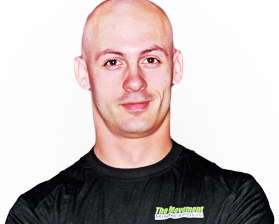
The path to greatness is clear, right? You set goals, you achieve those goals, eventually your goal is greatness and you achieve it.
And I’d argue that this works great when you set your sights 50 pounds above your current deadlift. The path is fairly clear, the objective is right in front of you, and the things you can measure along the way directly contribute to the end objective.
But how do you set your objectives if you’re trying to become the strongest person in the world?
Now the path isn’t as clear anymore. Should you first improve your pulling or pressing strength? Should you work on your grip? Should you build your work capacity? What do you do first? What do you do fiftieth? How do you address the inevitable setbacks? Do you plan ahead for them? Do you even know what your inherent advantage is going to be, the thing that sets you apart from those who aren’t the best? Everyone has one and if you don’t develop that (and quick) you’re much less likely to be the best…
You can see how it falls apart pretty quickly.
Now what if you are trying to to reach an objective for which the metrics are not clear at all? If you wanted to be the strongest person in the world you could pretty easily set out a list of metrics that, if all were achieved, would put you at or near the top of the pack.
But what if your objective is to make American schools the best in the world? What does best even look like? We already know that test scores on standardized testing have almost no bearing on quality of education. If you could pick any outcome in the world, what would you even measure? Eventual earnings throughout a lifetime? Well we know that anything over $75k doesn’t materially impact day to day happiness, so why measure a financial metric that maybe doesn’t reflect quality of life? We could try to measure happiness, but besides the difficulty in measuring something so nebulous, is that what we’re trying to achieve, just happy bubbly people?
Another way to think about this would be to look at the difference between the way that children learn about the fundamentals of moving their bodies through space, communicating with others, and keeping themselves alive by fulfilling basic needs. They do it through play, observation, and experimentation. Babies aren’t told that their next objective to crawl, they just start doing it and figure out that it’s a useful way to get where they want to go to break the next thing. Eventually they figure out that walking is even more effective and allows them to wreak even more destruction. And then adults come in all helpful-like and start setting objectives and I’d argue screw the whole thing up.
No one set out with the objective to create rock music, or to go to the moon before we even realized what the solar system was, or to create artificial intelligence before there was a computer, or to create antibiotics before we knew what germ was.
Objectives and metrics can be useful, for sure, especially if they’re just out ahead of you and the path is clear.
But I’d encourage you to consider that maybe objectives aren’t the end-all be-all when the path leads way over the horizon. You may not even know where you’re going until you start exploring that way and playing in the sandbox more.
Something to think about.


I dig this. Our company uses a leadership model called EOS. We live in 90 day increments. In those 90 days, each person has 3-5 ROCKS, or large goals. You can’t change the world in 90 days but you CAN take the first step. Then, go from there. Either keep going or decide maybe your efforts are best used elsewhere.
Thanks!
I like it